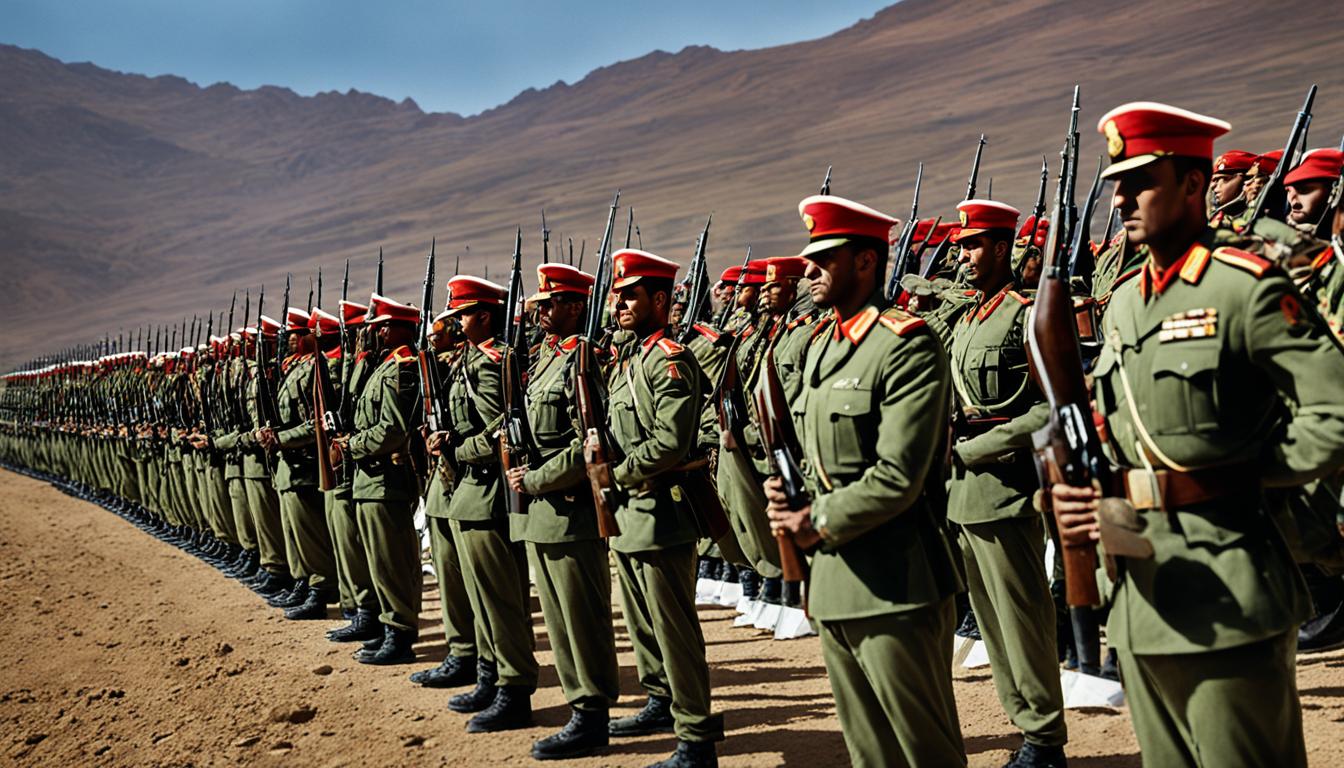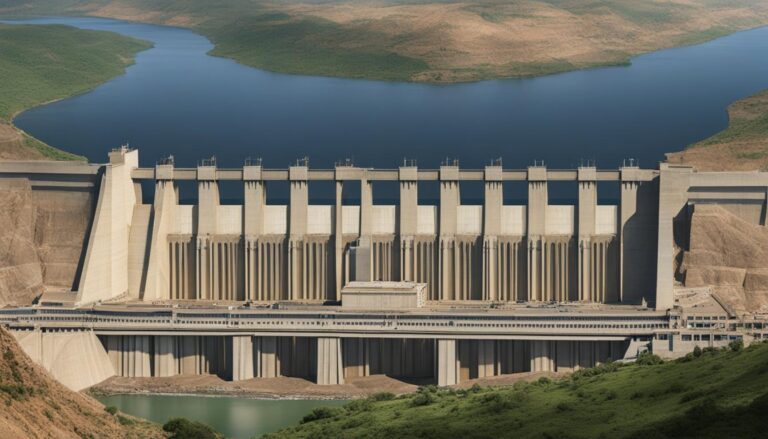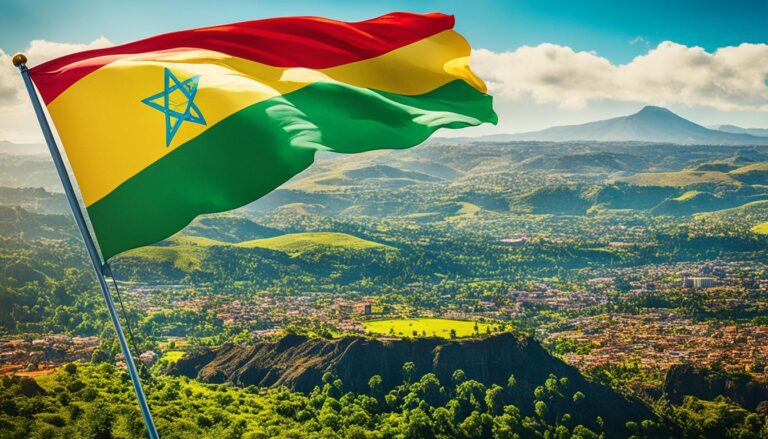Can Ethiopia Beat Egypt in War?
Did you know that the ongoing dispute between Ethiopia and Egypt over the Grand Ethiopian Renaissance Dam (GERD) has raised concerns about the potential for military conflict between the two countries? Egypt, backed by a growing chorus of countries including Sudan, has threatened to use force to defend its water resources.
Key Takeaways
- Despite Egypt’s military advantage, the outcome of a war between Ethiopia and Egypt remains uncertain.
- Diplomatic efforts should be prioritized to avoid the devastating consequences of armed conflict.
- The international community plays a crucial role in facilitating dialogue and finding a peaceful resolution to the dispute.
Ethiopia vs. Egypt Military Strength
In terms of military strength, Egypt holds a significant advantage over Ethiopia. Egypt’s Armed Forces rank ninth in the world, while Ethiopia’s military ranks 60th. This vast difference in rankings highlights the stark contrast in military capabilities between the two countries.
Let’s take a closer look at the key aspects of military strength:
Army
Egypt has a larger army compared to Ethiopia’s forces. While Egypt boasts a well-equipped and formidable army, Ethiopia’s army is relatively smaller.
Tanks and Armored Vehicles
Egypt possesses a larger number of combat tanks and armored vehicles, providing them with significant firepower on the ground. Ethiopia, on the other hand, has fewer tanks and armored vehicles.
Combat Aircraft and Attack Helicopters
Egypt maintains a stronger air force, with a greater number of combat aircraft and attack helicopters at their disposal. This air superiority provides Egypt with an advantage in aerial operations compared to Ethiopia’s air capabilities.
Naval Capabilities
One area where Ethiopia faces a significant disadvantage is in naval capabilities. Egypt possesses aircraft carriers and submarines, giving them a strategic edge in maritime operations. However, it is worth noting that Ethiopia is a landlocked country, which limits the relevance of naval capabilities in the context of a potential conflict.
While these factors demonstrate Egypt’s military superiority over Ethiopia, they are not the sole determinants of victory in a war. Other essential factors such as terrain, tactics, strategies, and the resolve of the armed forces come into play.
It is crucial to approach the analysis of military strength with a comprehensive understanding of the geopolitical complexities and historical context surrounding the Ethiopia-Egypt conflict.
“The strength of a nation lies not only in its military might but in its ability to navigate conflicts through peaceful means.” – Unknown
By assessing the military strengths and weaknesses of Ethiopia and Egypt, we can gain insights into the potential dynamics of a military confrontation. However, it is important to emphasize that peaceful resolutions and diplomatic negotiations are the preferred path to prevent the devastating consequences of armed conflict.
Let us now delve deeper into the geopolitical stakes in the Ethiopia-Egypt conflict, examining the broader implications and regional impact of this dispute.
Geopolitical Stakes in the Ethiopia-Egypt Conflict
The conflict between Ethiopia and Egypt over the Grand Ethiopian Renaissance Dam (GERD) goes beyond just their individual interests. It has significant geopolitical implications that extend to the entire region. The Nile River, on which both countries heavily rely for water resources and agriculture, holds crucial strategic importance.
The outcome of this conflict has the potential to impact regional stability and influence the balance of power in East Africa. It has sparked intense diplomatic engagements as both Ethiopia and Egypt seek support from other countries in the region. This rivalry has created a dynamic geopolitical landscape in which alliances are being formed and interests are being tested.
Considering the significance of the Nile River and the economic and political implications at stake, it is evident that the Ethiopia-Egypt conflict has broader ramifications beyond their borders. The resolution or escalation of this dispute will likely shape the geopolitical landscape in East Africa for years to come.
Ethiopia-Egypt Border Tensions
In addition to the dispute over the GERD, Ethiopia and Egypt have long-standing border tensions. The two countries share a border along the Nile River, and there have been occasional skirmishes and military incidents in the past. These border tensions add to the overall volatility of the situation and increase the potential for military conflict between the two countries.
Historical Border Disputes
The border tensions between Ethiopia and Egypt have historical roots. The Nile River serves as a natural boundary between the two countries, and both have claimed ownership over certain territories along the border. Disagreements over land and water access have fueled these tensions, creating a volatile situation that has persisted for years.
“The border disputes between Ethiopia and Egypt have been a source of contention for decades. Both countries have sought to protect their sovereignty and assert their interests in the region. This has created a delicate balance and has the potential to escalate into a full-blown conflict if not properly addressed,” says Dr. John Abakah, a geopolitical analyst.
Past Incidents
There have been occasional incidents along the Ethiopia-Egypt border, further exacerbating tensions between the two countries. In 2013, clashes between Ethiopian and Egyptian forces resulted in casualties on both sides. These incidents highlight the volatility of the situation and the need for diplomatic efforts to defuse tensions and prevent further escalation.
| Year | Incident | Casualties |
|---|---|---|
| 2013 | Clashes along the border | Multiple casualties |
| XXXX | XXXX | XXXX |
Note: The table above showcases past incidents along the Ethiopia-Egypt border. Please note that specific information for additional incidents is not available at this time.
While border tensions exist, it is crucial to acknowledge that diplomatic efforts can play a significant role in easing the strained relations between Ethiopia and Egypt. Finding a peaceful and mutually acceptable solution is of utmost importance to maintain regional stability.
Potential Outcomes of an Ethiopia-Egypt War
The ongoing dispute between Ethiopia and Egypt over the Grand Ethiopian Renaissance Dam (GERD) has raised concerns about the potential for military conflict between the two countries. While Egypt holds a military advantage over Ethiopia, the outcome of a war is uncertain. It is important to consider the potential outcomes of such a conflict.
Despite Egypt’s military strength, Ethiopia has certain advantages that could shape the outcome of a war. First and foremost, Ethiopia has a larger population, which could result in a larger pool of potential soldiers and more resilient resistance to external forces. Additionally, Ethiopia has a long history of resistance against colonialism and external aggression.
However, it is essential to recognize that a war between Ethiopia and Egypt would have devastating consequences for both countries and the region as a whole. The conflict could lead to significant casualties and destruction of infrastructure. Moreover, it’s unlikely that either side would achieve a decisive victory, given the complexities of fighting in a region with challenging terrain and diverse populations.
To avoid the disastrous outcomes of armed conflict, diplomatic efforts to resolve the dispute peacefully should be prioritized. Peaceful negotiations and dialogue can foster understanding, promote cooperation, and ensure a more stable and prosperous future for both Ethiopia and Egypt.
Historical Context of the Ethiopia-Egypt Conflict
The dispute between Ethiopia and Egypt over the Grand Ethiopian Renaissance Dam (GERD) is deeply rooted in a long-standing conflict over the Nile River. Egypt, as the downstream riparian country, has historically relied on the Nile for its water resources and agricultural productivity. Throughout history, Egypt has claimed historical rights to the river, considering it a vital lifeline for its civilization.
On the other hand, Ethiopia, as the upstream riparian country, views the construction of the GERD as a matter of national sovereignty. The dam represents a significant opportunity for Ethiopia’s economic development and energy generation. It empowers Ethiopia to harness the resources of the Nile within its territory and reduce its dependency on foreign aid.
This clash between historical rights and national sovereignty has fueled the intractability of the conflict between Ethiopia and Egypt. Both countries are deeply invested in protecting their respective interests and maintaining their historical narratives. Negotiations thus far have struggled to bridge this fundamental gap.
“The dispute over the GERD is not just about water allocation, but it’s also about identity, pride, and historical narratives. Both Ethiopia and Egypt are keen on protecting their interests and preserving their national sovereignty.”
The Political and Strategic Interests
Beyond the historical context, the Ethiopia-Egypt conflict is also driven by political and strategic interests. Ethiopia, with its rapidly growing population and aspirations for economic development, sees the successful completion and operation of the GERD as vital to achieving its long-term goals. It considers the dam a symbol of progress and a means to lift millions of its citizens out of poverty.
On the other hand, Egypt is concerned about the potential impact of the GERD on its water supply, agriculture, and hydroelectric capacity. With its expanding population and limited water resources, Egypt fears that the dam’s filling and operation will exacerbate its water scarcity and threaten its food security. In response, Egypt seeks to uphold its historical rights and ensure its access to adequate water resources for its population and agricultural needs.
The convergence of history, national sovereignty, and political and strategic interests has created a complex and challenging environment for resolving the Ethiopia-Egypt conflict. Diplomatic efforts must navigate these nuanced dynamics to find a mutually acceptable solution.
| Egypt | Ethiopia |
|---|---|
| Emphasizes historical rights over the Nile | Views GERD as a matter of national sovereignty |
| Concerned about water scarcity and food security | Aspires for economic development and poverty reduction |
| Fears impact on agriculture and hydroelectric capacity | Sees the dam as a symbol of progress and self-reliance |
Threats of Military Action
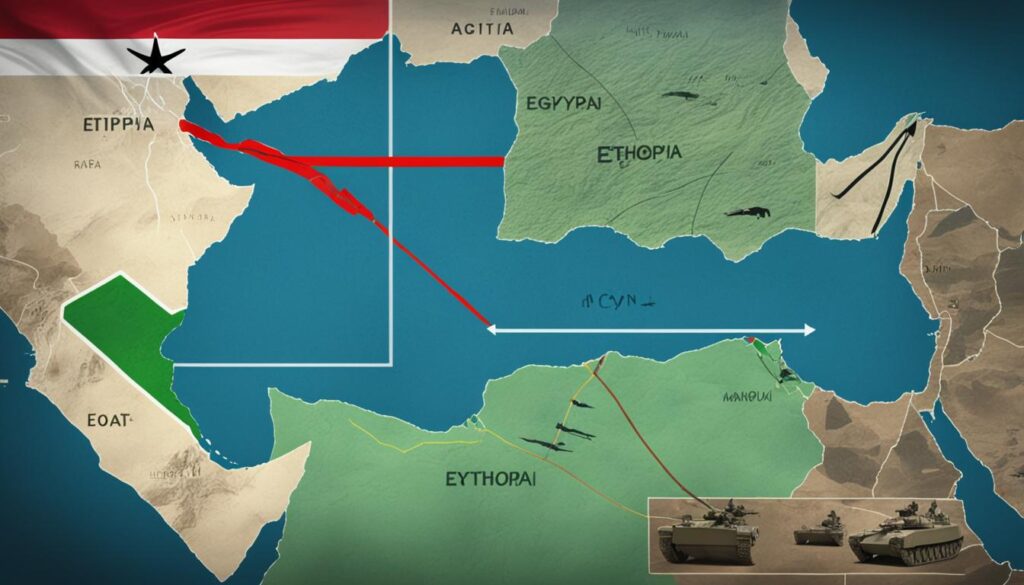
Both Ethiopia and Egypt have made statements threatening military action in response to the GERD dispute. Ethiopia considers the dam as a symbol of national pride and economic development, while Egypt sees it as a direct threat to its water resources. These threats of military action have exacerbated tensions between the two countries, escalating the risk of conflict.
The GERD conflict has reached a critical point, with both nations using strong rhetoric and posturing to assert their positions. Ethiopia, driven by its ambition for economic growth and energy independence, has declared that it will protect its sovereignty at all costs. On the other hand, Egypt, heavily reliant on the Nile River for its water supply and agricultural productivity, perceives the dam as an existential threat to its national security.
“We will not allow anything that could harm our water security or rights… If there is a drop of water to our brothers in Sudan and later to us, the Nile will flow forever.”
These threats of military action have created a dangerous environment, raising concerns among the international community about the potential for armed conflict. The situation is further complicated by the historical animosity between Ethiopia and Egypt and their longstanding border tensions.
The international community must play a pivotal role in preventing further escalation of the conflict. Dialogue and diplomacy should be prioritized to find a peaceful resolution that addresses the water security concerns of both nations. Efforts to mediate the dispute, such as those led by the African Union and the United Nations, are crucial for fostering mutual understanding and cooperation.
It is essential for Ethiopia and Egypt to recognize that military action would have devastating consequences for both their countries and the wider region. Instead of resorting to war, they should focus on finding compromise and sustainable solutions through peaceful negotiations. The stakes are high, and the potential for lasting harm cannot be overstated.
Egypt’s Concerns and Threats over the Dam
Egypt has expressed long-standing concerns about the potential impact of the Grand Ethiopian Renaissance Dam (GERD) on its water supplies, agricultural sector, and hydroelectric capacity. The Nile River, which is vital to Egypt’s survival, provides the country with 97% of its freshwater resources.
The Egyptian government has carefully analyzed the implications of the dam project and has considered various military options to safeguard its national interests. Discussions have revolved around potential aerial raids, special forces attacks, and even overland strikes.
However, the feasibility and effectiveness of these military options remain uncertain. Any military action against the GERD would risk escalating the conflict and leading to severe regional consequences.
Egypt’s Military Advantage
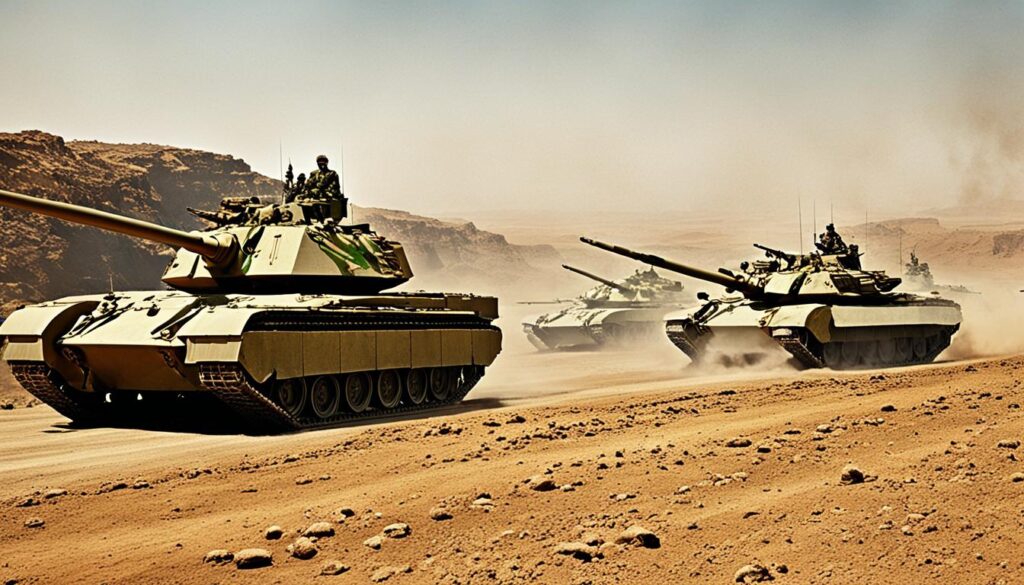
Egypt holds a significant military advantage over Ethiopia in terms of overall strength and capabilities. The Egyptian Armed Forces are ranked ninth in the world, while Ethiopia’s military ranks 60th. This stark difference in rankings highlights the significant gap in military power between the two countries.
Strength in Numbers and Technology
One key aspect of Egypt’s military advantage is its larger army. With a well-trained and well-equipped force, Egypt’s army poses a formidable threat in any potential conflict. Additionally, Egypt possesses more advanced weaponry, including combat tanks, armored vehicles, combat aircraft, and attack helicopters. These cutting-edge military assets allow Egypt to project power and engage in offensive operations if necessary.
Air and Naval Superiority
Furthermore, Egypt boasts a stronger air force and navy compared to Ethiopia. With a larger and more advanced air fleet, including fighter jets and bombers, Egypt has the capability to exercise dominance in the skies. The Egyptian navy, equipped with aircraft carriers and submarines, also possesses the capacity to exert control over key maritime areas. This air and naval superiority provides Egypt with significant leverage and strategic advantage in any military engagement.
Factors Influencing Outcome
While Egypt’s military advantage is undeniable, it is important to note that military strength alone does not guarantee victory in a war. The outcome of any conflict would depend on various factors, including the strategies, tactics, and resilience demonstrated by both sides. Ethiopia, despite its lower ranking and smaller military force, could leverage its larger population and history of resistance against external forces to mount a formidable defense.
Evaluating the Balance of Power
Ultimately, the power dynamics between Ethiopia and Egypt in a potential military confrontation are complex and influenced by multiple factors. While Egypt’s military advantage gives it the capacity to launch military operations, the presence of geopolitical considerations, regional alliances, and diplomatic efforts to find a peaceful resolution should not be underestimated. A war between Ethiopia and Egypt would have far-reaching consequences and should be avoided at all costs.
Challenges for Egyptian Military Action
Despite Egypt’s military advantage over Ethiopia, there are significant challenges that would complicate any effective military action in the ongoing conflict. These challenges include logistical constraints, political obstacles, and the potential for Ethiopia to rally its population and mobilize a large force against Egyptian aggression.
Logistical constraints pose a major challenge for Egypt. With their landlocked position, Ethiopia has limited access points that can be targeted, making it difficult for Egypt to mount swift, strategic military operations. Furthermore, Ethiopia’s diverse topography, including mountainous regions and dense forests, would provide natural cover and impede advancements by Egyptian forces.
Political obstacles are another hurdle for Egypt in pursuing military action. The international community has expressed concerns over the potential escalation of the conflict and the devastating consequences it could have on the region. Diplomatic pressure and sanctions against Egypt could further hinder their military objectives, calling for a more peaceful resolution.
Beyond logistical and political challenges, Egypt must also consider the potential for Ethiopia’s population to rally behind their nation’s defense. Ethiopia has a history of resistance against external forces, and any military intervention by Egypt could galvanize the Ethiopian people. Mobilizing a large force committed to protecting their sovereignty would increase the difficulty and cost of any military action.
“Egypt would face significant challenges in mounting effective military action against Ethiopia due to logistical constraints, political obstacles, and the potential for Ethiopian population mobilization.”
Diplomatic efforts to find a peaceful solution should be prioritized over military action. Instead of resorting to war, diplomatic negotiations, mediated by neutral parties, would allow both countries to address their concerns and find a mutually beneficial agreement. By focusing on conflict resolution strategies, Ethiopia and Egypt can work towards peaceful coexistence and sustainable use of the Nile River.
| Challenges for Egyptian Military Action |
|---|
| Logistical constraints |
| Political obstacles |
| Potential for Ethiopian population mobilization |
Conclusion
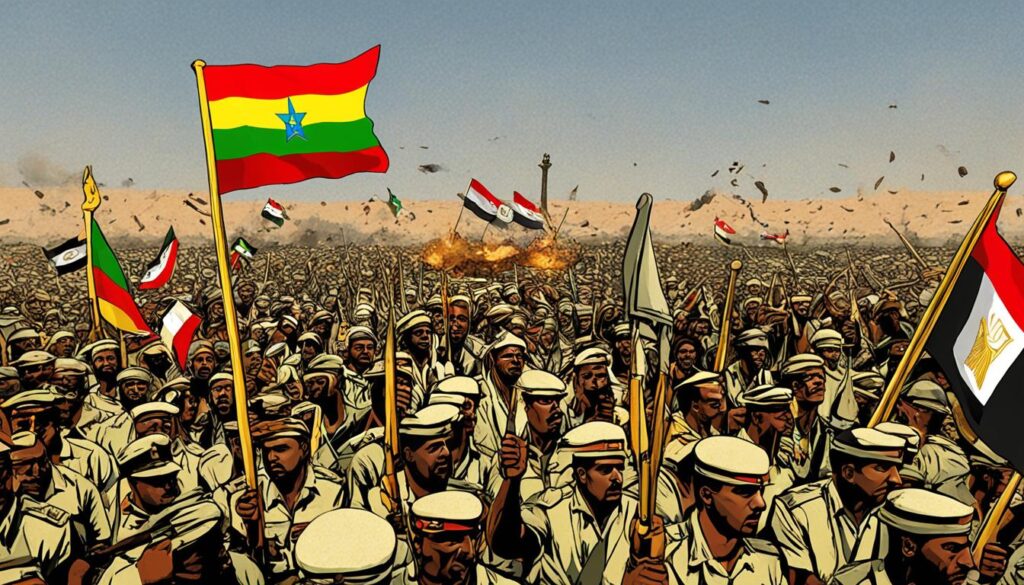
The potential for Ethiopia and Egypt to engage in war is a concerning prospect given the geopolitical stakes and the potential impact on regional stability. While Egypt holds a military advantage, the outcome of a war is uncertain and would likely result in significant casualties and destruction. Diplomatic efforts to resolve the conflict peacefully should be prioritized to avoid the devastating consequences of armed conflict.
It is clear that the Ethiopia-Egypt conflict over the GERD has far-reaching implications beyond the two countries involved. The geopolitical rivalry between Ethiopia and Egypt, centered around the Nile River, has the potential to influence the balance of power in East Africa and impact regional stability. The risk of a military confrontation between the two countries underscores the need for diplomatic dialogue and international mediation.
“War is not the solution to this dispute. It would bring about unimaginable destruction and suffering for both Ethiopia and Egypt. We must prioritize peaceful negotiations to find a mutually beneficial solution and avoid the devastating consequences of armed conflict.”
The international community plays a crucial role in facilitating dialogue and promoting a peaceful resolution to this dispute. It is essential for regional and global powers to encourage both Ethiopia and Egypt to seek common ground and negotiate in good faith. Efforts should be made to address the concerns and interests of all parties involved, ensuring a sustainable solution that takes into account the water needs of both countries and promotes cooperation rather than confrontation.
By prioritizing diplomacy over war, we have the opportunity to resolve the Ethiopia-Egypt conflict in a manner that benefits all stakeholders. This will not only safeguard regional stability but also foster long-term cooperation and understanding between Ethiopia and Egypt. It is in the interest of both countries, as well as the international community, to find a peaceful resolution and avoid the potential negative outcomes of an armed confrontation.
The Way Forward: Prioritizing Diplomatic Solutions
To de-escalate the tensions and move towards a peaceful resolution, the following steps should be taken:
- Engage in high-level diplomatic talks facilitated by neutral actors.
- Establish a framework for dialogue that addresses the concerns and interests of both Ethiopia and Egypt.
- Encourage transparency and information sharing to build trust between the two countries.
- Promote regional cooperation and joint resource management initiatives to mitigate the water-related challenges in the region.
- Seek international support and mediation to ensure a fair and sustainable agreement.
No military solution can bring lasting peace and stability in the Ethiopia-Egypt dispute. It is only through peaceful negotiations and diplomatic efforts that a mutually beneficial resolution can be achieved. The stakes are high, but with the right approach and commitment from all parties involved, we can find a pathway to peace and ensure the well-being of both Ethiopia and Egypt.
Conclusion
The ongoing dispute between Ethiopia and Egypt over the Grand Ethiopian Renaissance Dam (GERD) is a cause for concern as it raises the potential for military conflict. While Egypt holds a significant military advantage over Ethiopia, it is uncertain whether Ethiopia can beat Egypt in a war. Therefore, diplomatic efforts to find a peaceful resolution must be prioritized to prevent the devastating consequences of armed conflict.
It is crucial for the international community to play an active role in facilitating dialogue between Ethiopia and Egypt and promoting a peaceful resolution to this dispute. By engaging in diplomacy and encouraging both parties to find common ground, we can help prevent the destabilization of the region and safeguard the lives and livelihoods of those affected by the conflict.
While military strength is a factor, it is important to recognize that the outcome of a war is not solely determined by military might. Other factors, such as political dynamics, societal resilience, and the ability to rally support, can influence the outcome. Ultimately, a peaceful resolution is the ideal outcome for all parties involved and should be pursued with urgency.

